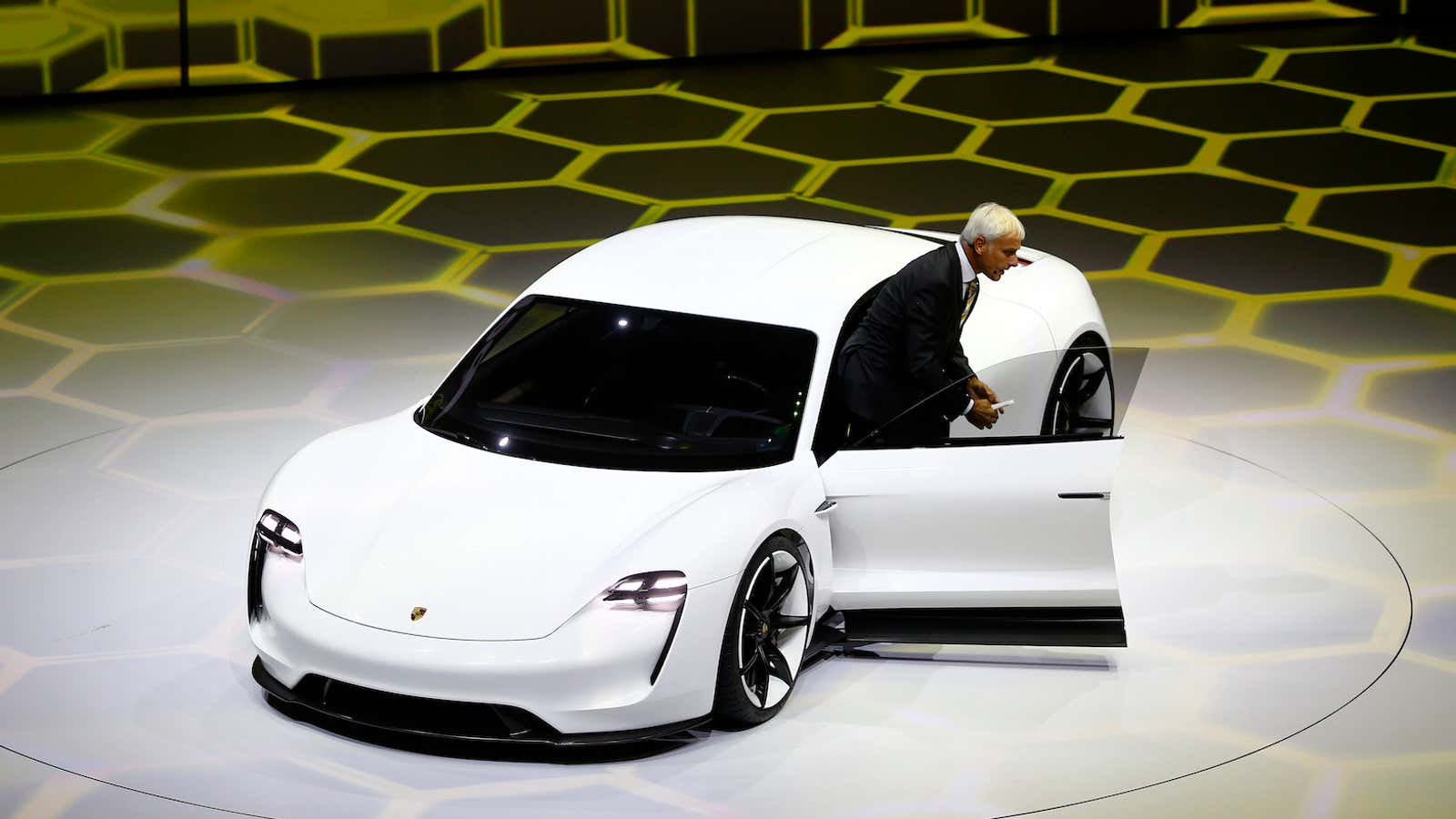After years of having the electric-car market to himself, Elon Musk has competition just as he’s starting to come to grips with the trauma of mass-producing cars. GM has the Chevy Bolt, though how well that’s doing is anyone’s guess. Volkswagen is fully committed to electrification as it emerges from the diesel scandal. And Toyota plans to offer electric versions of each of its models by 2025.
In the higher-end luxury space, though, Tesla is still sitting pretty.
It remains defined by the four-door sedan, the Model S, which is one of the best-reviewed cars of recent times. That car still has relatively little competition. There is the just-launched i-Pace from Jaguar and, soon, the Porsche’s Taycan, the car formerly known as the Mission E that will be on sale from 2020.
When Porsche first announced production plans for the Taycan, it intended to make 20,000 of the cars a year. But Porsche chairman Oliver Blume recently told German newspaper WirtschaftsWoche, according to an article translated by Electrek, that it’s planning to increase that. “Due to the positive response, we will adjust this number upwards, especially since the Cross Turismo as the first derivative of the Taycan got green light for the series,” Blume said.
He’s referring to the all-electric crossover version of the Taycan that the Porsche board approved bringing to production in October, which essentially means the company is now in the process of producing two high-end electric cars at once, after years of skepticism over electrification. (Crossover utility vehicles, which are some of the most popular cars on American roads, are more compact versions of the sport utility vehicle.)
When Musk launched the Model 3 in 2016, he said he was “fairly confident” that deliveries would begin by the end of 2017, which did not happen. You can bet that Porsche won’t be late to deliver the Taycan—either of them.
This is the crux of Porsche’s biggest advantage over Tesla. The storied European sportscar brand has been making cars since 1948 and SUVs since 2002. As it is doing now with its move into electric cars, Porsche is able to respond to demand cues because it has large factories in Stuttgart and Leipzig in Germany and Bratislava in Slovakia that are able to scale production as needed and having been doing so for decades.
Blume told WirtschaftsWoche the decision to make more Taycans came from seeing the number of preorders. In Norway alone, where Porsche normally sells 600 cars a year, it has gotten 3,000 reservations for the Taycan. When Blume sees signals like that, he is able to move quickly. It helps that he is part of the Volkswagen family (paywall) and that the company is very successful in the gas-powered world; in the 2017 fiscal year, the company shipped 246,375 cars and made an operating profit of €4.1 billion, making it one of the most profitable car companies in the world.
Tesla is 15 years old. Last year, it had an operating loss of $1.6 billion while selling 101,312 cars. While it recently made its first quarterly profit since 2016 and met its target for Model 3 output, Elon Musk admitted that the company had to go through “production hell” to do so, even building a tent outside its Fremont, California factory. It is negotiating new factories to build its batteries in China and Europe, which it has to do at the same time as producing the cars that contain them. In addition to making the Model 3, the company has to keep producing its Model S and Model X vehicles. And now it’s getting ready to ramp up the manufacture of the Tesla Semi, announced last year.
None of that helps the timeline for Tesla’s own crossover vehicle, the Model Y. This was announced years ago; Musk insists it is ready for production now and that it will be a “manufacturing revolution.” Business Insider got its hand on some internal documents that show Tesla plans to build 7,000 Model Ys a week by the end of 2020 from its factories in Nevada and China, but Tesla calls those plans “outdated.”
Tesla revolutionized the car industry by bringing electric cars into the mainstream. But in many ways, it is a victim of its own success. “If you look at what Tesla has done, if you look at their volume and look at their price level, it’s truly astonishing,” Blume himself said recently. “If you can do that with one brand and a sales network that is not comprised of dealers and a real sales organization, it’s even more astonishing.”
Now that Tesla has done all that, Porsche can step in.
N.B. Please note I own a very small amount of Tesla stock.
